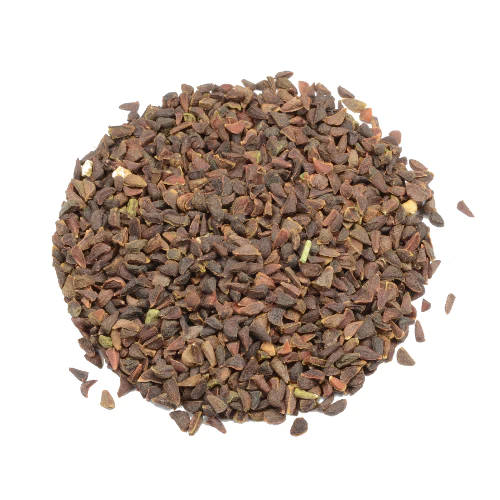Syrian Rue Seeds (Peganum Harmala)
$34.00 – $144.00Price range: $34.00 through $144.00
Experience the rich heritage and diverse applications of Peganum harmala seeds. Order now to incorporate this versatile botanical into your practices.
Peganum Harmala Seeds For Sale
Peganum harmala, commonly known as Syrian Rue, is a perennial herbaceous plant native to the Mediterranean region and parts of Asia. Renowned for its rich cultural history and diverse applications, Syrian Rue seeds have been utilized in traditional medicine, dye production, and spiritual practices across various cultures.
Product Description
Botanical Information:
- Scientific Name: Peganum harmala
- Family: Nitrariaceae
- Common Names: Syrian Rue, Harmal, Esfand, African Rue
Seed Details:
- Appearance: Small, dark brown to black seeds
- Origin: Sourced from regions where the plant is native, ensuring authenticity and quality
- Purity: Our seeds are wild-harvested, non-GMO, and free from contaminants
Uses and Applications
Traditional Uses:
- Cultural Practices: In countries like Iran and Turkey, dried capsules of Peganum harmala are hung in homes or vehicles to protect against the evil eye. Burning the seeds is also a common practice in Persian cultures for warding off negative energies.
- Medicinal Applications: Traditionally, the seeds have been used as an analgesic, emmenagogue, and abortifacient agent. They have also been employed to expel parasitic worms and treat recurring fevers.
Modern Applications:
- Dye Production: The seeds produce a red dye, often referred to as “Turkey red,” used in Western Asia to dye carpets and wool. Depending on the extraction method, the seeds can yield yellow fluorescent or red dyes.
- Research Interest: Peganum harmala seeds contain harmala alkaloids, such as harmine and harmaline, which are reversible inhibitors of monoamine oxidase A (MAO-A). These compounds have garnered interest for their potential therapeutic properties, including antimicrobial and antioxidant effects.
Benefits
- High Alkaloid Content: The seeds are rich in beta-carboline alkaloids, notably harmine and harmaline, which have been studied for their pharmacological effects.
- Potential Health Benefits: Research indicates that Peganum harmala exhibits substantial antioxidant and anti-inflammatory activities, which may contribute to its traditional medicinal uses.
Usage Instructions
- Preparation: Traditionally, the seeds are either burned to release aromatic smoke or ground into a powder for various applications.
- Dosage: Due to the potent nature of the alkaloids present, it’s crucial to adhere to recommended dosages. Consultation with a qualified healthcare professional is advised before use.
Safety and Precautions
- Consultation: Always consult with a healthcare provider before incorporating Peganum harmala seeds into any regimen, especially if you are pregnant, nursing, or have underlying health conditions.
- Potential Side Effects: The seeds contain potent alkaloids that can cause side effects such as hallucinations, neurosensory syndromes, bradycardia, nausea, and vomiting if consumed inappropriately.
- Interactions: Due to their MAO-A inhibitory effects, the seeds may interact with certain medications and foods. It’s essential to be aware of these interactions to prevent adverse effects.
Legal Considerations
- Regulatory Status: The legal status of Peganum harmala seeds varies by region. In some U.S. states, the plant is considered a noxious weed, and regulations may restrict its sale or possession. Internationally, countries like Australia, Canada, and France have specific regulations concerning harmala alkaloids.
- Compliance: Ensure compliance with local laws and regulations before purchasing or using these seeds.
Customer Reviews and Testimonials
“I’ve used these seeds in traditional dyeing processes, and the results are consistently vibrant. High-quality product!”
“Burning these seeds has become a cherished ritual in our home. The aroma is soothing, and it brings a sense of peace.”
Frequently Asked Questions (FAQs)
-
How should I store Peganum harmala seeds?
Store the seeds in a cool, dry place away from direct sunlight to maintain their potency and prevent spoilage.
-
Are these seeds organic?
Yes, our Peganum harmala seeds are wild-harvested and free from pesticides or chemical treatments.
-
Can I use these seeds for dyeing fabrics?
Absolutely. The seeds produce a rich red dye suitable for various textiles.
Related Products
- Natural Indigo Dye: Complement your dyeing projects with our high-quality indigo powder.
- Madder Root: Another traditional dye source, offering a range of red hues.
- Traditional Incense Blends: Explore our selection of aromatic herbs and resins for spiritual practices.
| Quantity | 100g, 250g, 500g, 1kg |
|---|


Reviews
There are no reviews yet.